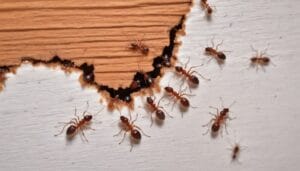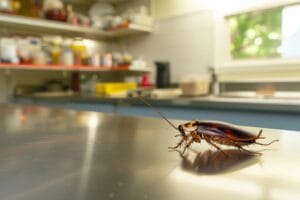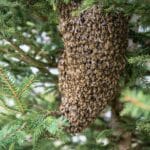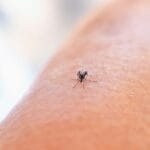Key Takeaways
- Ensure doors and windows are properly sealed to block entry points for pests.
- Keep your kitchen clean and store food in sealed containers to deter pests.
- Maintain your yard and manage garden moisture to prevent pest habitats.
- Declutter your home regularly to minimize hiding spots for bugs and rodents.
- Engage natural predators and plant pest-repelling flora as eco-friendly strategies.
Most importantly, preventing pests from entering your home is far easier than dealing with an infestation. It all starts with a solid defense: sealing your home. You’d be surprised how many unwanted guests can squeeze through the tiniest of gaps!
Tightening Up: Door and Window Seals
Inspect your doors and windows. Are there gaps? If light can get through, bugs can get in. Here’s what you need to do:
- Install or replace weather stripping around doors.
- Use door sweeps on the bottom of doors, especially exterior ones.
- For windows, check the seals and use silicone caulk to fill any gaps.
Remember, it’s not just about keeping bugs out. Properly sealed doors and windows also improve energy efficiency, which can save you money on utility bills.
Crack Down: Repairing Home Exteriors
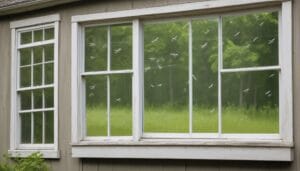
Next, take a walk around the outside of your house. Look for cracks in the foundation, loose siding, or gaps where utilities enter your home. These can be open invitations to pests. Seal them up with caulk or expandable foam. Because the exterior of your home is the first line of defense against pests, keeping it intact is crucial.
Here’s an example of how effective this can be:
“After sealing the cracks around my home’s foundation, I noticed a significant decrease in the number of insects and spiders in my basement. It was a simple fix that made a big difference.”
Now, let’s turn our attention to the heart of the home: the kitchen. This area can be a major battleground in your war against pests if not managed correctly.
Your Kitchen: A Pest-Free Zone
Smart Storage: Keeping Food Sealed

It’s simple: pests come looking for food. If they can’t find it, they’ll move on. So, make sure all your food is stored in sealed containers. This includes pet food, which is often overlooked. Invest in airtight containers for pantry items like cereals, flours, and sugars. Not only will this keep pests out, but it will also keep your food fresher longer.
Leftovers: The Right Way to Store Them
Leftovers should go straight into the fridge or freezer in sealed containers. Besides that, regularly clean out your fridge to avoid old food turning into a pest magnet. Remember, a crumb for us can be a feast for them, so keep those counters and floors crumb-free!
Consider this:
“Ever since I started storing my food in sealed containers, I’ve noticed fewer ants and fruit flies in my kitchen. It’s a small change that’s made a big difference.”
Landscape and Garden Defense Tactics
Trimming the Problem: Yard Maintenance

Maintaining your yard is more than just keeping it looking nice; it’s a strategic move against pests. Keep your grass cut short and bushes trimmed away from your house. This reduces the number of places pests can hide and breed. Also, clean up any yard waste, like piles of leaves or clippings, as these can be perfect homes for pests.
Water Works: Managing Moisture in Your Garden
Pests love damp areas. Ensure your garden has proper drainage and fix any leaky faucets or sprinklers. Standing water is an invitation for mosquitoes to breed, so be vigilant about emptying any containers that collect rainwater.
The Cleanup Crew: Reducing Clutter
Order in the House: Organizing Indoor Spaces

Clutter isn’t just an eyesore; it’s a haven for pests. They love to hide in stacks of newspapers, piles of laundry, or boxes of stored items. By keeping your home organized and clutter-free, you’re removing potential nesting spots. So, declutter regularly and be ruthless about it! For more guidance, check out these spring pest-proofing tips to ensure a pest-free home.
Garbage Guard: Proper Trash Storage
Trash should be stored in bins with tight-fitting lids and taken out regularly. If pests can’t get to your trash, they have less reason to come inside. And don’t forget to regularly clean those bins to remove any spills or debris that might attract bugs and rodents.
Here’s a pro tip:
“I’ve found that using bins with locking lids has greatly reduced the number of pests in my home. It’s a simple solution that keeps trash in and bugs out.”
Adopting a Pest-Resistant Lifestyle
Living a pest-resistant lifestyle means incorporating habits that naturally deter pests. It’s about creating an environment where pests have fewer reasons to enter and stay in your home. It’s a proactive approach that can save you a lot of trouble down the line.
Building Habitats: The Role of Routine Cleaning

Regular cleaning is one of the most effective ways to keep pests at bay. A clean home offers fewer resources for pests to survive on. Ensure you’re vacuuming regularly, wiping down surfaces, and not leaving dirty dishes out overnight.
It’s also essential to address spills and crumbs immediately. Pests have a keen sense of smell and even the smallest crumb can attract them. By keeping your living spaces clean and tidy, you’re taking away their food sources and discouraging them from sticking around.
Community Efforts: Neighbors United Against Pests
It’s also beneficial to work with your neighbors to create a pest-resistant community. Pests don’t recognize property lines, so if your neighbor has a pest problem, it could soon become your problem too.
- Share tips and strategies for pest prevention.
- Coordinate yard maintenance to eliminate shared pest habitats.
- Organize community clean-up days to reduce overall clutter and waste.
By coming together, you can tackle pest issues more effectively and maintain a healthier environment for everyone.
DIY Pest Control: Tools and Techniques
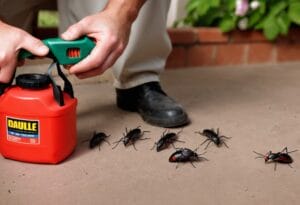
DIY pest control can be an effective way to manage minor pest issues. With the right tools and techniques, you can keep pests under control without always having to call in the professionals.
Home-Made Mixtures: Natural Remedies for Pests
There are many natural substances that pests find unappealing. For example, a mixture of water and vinegar can deter ants, while diatomaceous earth can be effective against a variety of crawling pests. Just be sure to research each method to ensure it’s safe and suitable for your particular problem.
Mechanical Mastery: Traps and Barriers
Traps and barriers are another great DIY approach. Sticky traps can catch crawling insects, and a well-placed barrier can prevent them from accessing certain areas of your home. You can even make your own barriers with items like copper mesh or line entry points with substances pests dislike, such as boric acid.
Remember, the key to effective DIY pest control is persistence and consistency. You need to regularly check and maintain your traps and barriers to ensure they remain effective.
FAQs
Here are some frequently asked questions that can further guide you in your quest for a pest-free home:
How can I make my home less attractive to pests?
To make your home less attractive to pests, eliminate their food sources, water, and hiding places. Store food in sealed containers, fix leaks, and declutter regularly. Proper sanitation is critical.
Are there any pet-friendly pest control methods?
Yes, there are pet-friendly pest control methods. Use natural deterrents like vinegar for ants, and opt for pet-safe baits and traps. Always check the label on pest control products to ensure they’re safe for pets.
Consider this: for homeowners, the arrival of warmer weather can often mean dealing with unwanted pests. Whether you’re facing an infestation of ants, termites, or other unwelcome guests, it’s important to take action to maintain a bug-free home.
“When using pest control products, I always make sure they are pet-friendly since I have two curious dogs at home. I often opt for natural solutions like essential oils that are known to repel insects but are safe for pets.”
Can pests become resistant to chemicals over time?
Pests can develop resistance to chemicals over time, especially if the same products are used repeatedly. To prevent this, rotate different types of control methods and use chemical treatments as a last resort.
What should I do if I see signs of an infestation?
If you notice signs of an infestation, act quickly. Identify the pest, clean the area thoroughly, and use appropriate traps or baits. If the problem persists, it may be time to call in professional help.
How can I maintain a bug-free home year-round?
Maintaining a bug-free home year-round involves a combination of good habits and regular maintenance. Clean regularly, seal up entry points seasonally, and stay vigilant about inspecting your home for signs of pests. Also, consider seasonal treatments around your home’s perimeter as a preventative measure.
With these strategies in place, you can enjoy a comfortable, pest-free living space. Remember, the key to winning the war on pests is consistency and a little bit of know-how. Stay vigilant, and you’ll be well on your way to maintaining a bug-free home!
